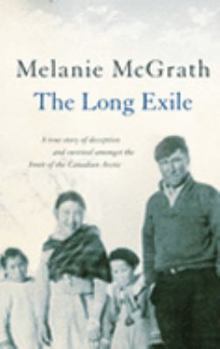The Long Exile: A True Story of Deception and Survival in the Canadian Arctic
Select Format
Select Condition 
Book Overview
In 1952, the Canadian government forcibly relocated three dozen Inuit from their flourishing home on the Hudson Bay to the barren, arctic landscape of Ellesmere Island, the most northerly landmass on... This description may be from another edition of this product.
Format:Paperback
Language:English
ISBN:0007157975
ISBN13:9780007157976
Release Date:October 2007
Publisher:Harper Perennial
Length:324 Pages
Weight:0.50 lbs.
Dimensions:0.9" x 5.1" x 7.8"
Customer Reviews
5 ratings
Enlightening Tale of Nanook of the North
Published by Thriftbooks.com User , 15 years ago
This is the other side of the most-acclaimed documentary of all time, Robert Flaherty's "Nanook of the North." Learn how Flaherty fathered a son there and abandoned him to the fate of the Canadian government and their cruel treatment of the Inuit (which mirrors that of the US with American Indians). McGrath is a brilliant writer whose vast knowledge of the subject extends from the Inuit language to knowing how sled dogs react to different climates, to the every custom of the Inuit people. The book is a page turner, not a tract, however, and on every page the Arctic lives.
Riveting, important, and timely
Published by Thriftbooks.com User , 15 years ago
For anyone who imagines, as I did before reading this book, that the forced relocation of indigenous people in North America was something that happened historically--but not now, not in our lifetimes--The Long Exile is an important wake-up call. The Inuit whose story McGrath tells here were finally allowed the option to leave their involuntary imprisonment on their "reservation" (my term, not hers or theirs) in the most inhospitable lands on Planet Earth other than Antarctica, in ... wait for it ... 1993. Yes, 1993. Beautifully and simply written, this essential chapter of North American history wasn't in any history book I'd ever read. McGrath reveals this history primarily through tracing a single family's experiences. That family, tellingly, includes the all-but-forgotten son of a famous white documentary maker, left behind in the Arctic before his birth to an equally forgotten Inuit mother. The family, along with six others, was forcibly moved from their native homeland to a location so near the North Pole as to be almost uninhabitable--but the white Canadians who wanted to strengthen their country's claim to their northernmost shores naively (and wrongly) insisted that the Inuit could thrive anywhere. That action, taken in the early 1950's, wasn't even partially remedied until the 1993 hearings in which the voices of the Inuit involved were finally heard. And, although Canada has set up a fund to provide for the people it harmed through this ill-conceived action, the nation has yet to issue a formal apology for the misery and death they caused. The story is heart-wrenching, but I'm very glad to have read it. It seems an important story to know, somehow, despite my certainty that it's not going to be included in any forthcoming history books, either. Since her writing's excellent, the descriptions vivid, the characters well-drawn, and the action continuous, McGrath's telling makes for good reading, too. Visit your library and pick it up. You won't regret the time spent in the far North, learning a thing or two from the Inuit there.
Wow. Powerful and hard to put down.
Published by Thriftbooks.com User , 16 years ago
Detailed, yet very readable account of the forcible exile of several Inuit families to the far North. Conditions were execrable, and the overbearing ignorance and paternalism of the white Canadians lasted for years. Not until the 1990s was justice finally done, but too late for many. Hard to put down.
A must read
Published by Thriftbooks.com User , 16 years ago
I just finished this book which I took out of the library new book shelf without any prior knowledge of it. It is a wonderfully told story, both of Robert Flaherty, and of the Inuit. I had not known about Flaherty although I have quite a bit of connection to Upper Michigan where he grew up. The amount of research Ms McGrath has put into this work is very impressive. Now we just need more books like this about other so-called aboriginal peoples.
High Arctic Horror Story - On TWO Levels
Published by Thriftbooks.com User , 17 years ago
While all the reviews I have seen praise Melanie McGrath's The Long Exile for being fascinating, well documented, and different, none of them looked at the second level. At bottom, this is the story of how the government of Canada manipulated people through the Royal Canadian Mounted Police (RCMP). While most of us in the west think of police as enforcing the law, the RCMP was used to implement social and political policy, deploy civil service directives, and herd people to where government departments thought they would more good for the political agenda. That this has never been the subject of investigation is a horror story in and of itself. The RCMP lied to the Inuit, they got them to give up their homes on false pretenses, treated them like dirt on their awful journey, did nothing to help them in the dire straits the RCMP placed them in, lied again about going home, trapped them into a hopeless, miserable life, and of course, denied all of it. Yes, it's fascinating that the high arctic is actually a desert where the Inuit can't find enough snow to build a winter home. Yes, it's fascinating that this whole fifty year story has a common thread through Robert Flaherty and his Nanook of the North, Yes, it's astonishing that anyone can live in these conditions - and how they do it is both spellbinding and heartrending. But the political aspects are at least as horrifying, especially in seemingly peaceloving, friendly Canada. This is an excellent book for more reasons than a snowy cover would indicate.





